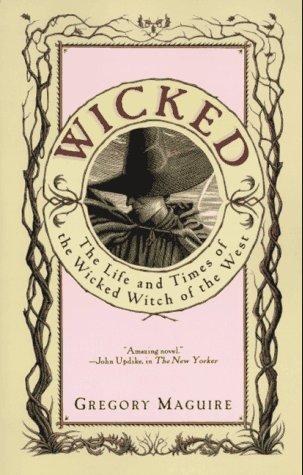
Here's what I know about The Wizard of Oz:
1. When you play Pink Floyd's Dark Side of the Moon after the MGM lion roars 3 times, crazy stuff happens.
2. Supposedly some guy tried to kill himself in the background and the scene is in the film.
3. "Somewhere Over the Rainbow" is highly overrated.
4. My first big stage break came playing The Wizard at Central Junior High school. My voice hadn't changed yet, so my big threatening line "I am Oz the Great and Terrible" turned out to be pretty hilarious.
That's really about it. Yes, I'm from Kansas, so I've heard more Dorothy Gale jokes than should be legally allowed by law, but frankly it was never a story that quite captured my attention. So I never bothered to read the popular series of books (there are 40 of them, by the way -- 14 written by L. Frank Baum and 26 written by other authors) and had no real interest in reading Gregory Maguire's Wicked: The Life and Times of the Wicked Witch of the West, a retelling of the well-known story from the perspective of the Witch.
Then I went to Barnes and Noble, and the book was on sale. I'm a sucker for a sale.
Maguire's book was made into a Broadway musical a few years ago, but don't let that scare you away. This author's take on the merry old land of Oz is not rainbows and rousing musical numbers. Rather Maguire's Oz provides a way to explore faith, politics, the nature of evil, racism, and just about anything else you can think of. It's a long tale spanning more than thirty years and with a large cast of characters. While it doesn't always work perfectly, the retelling is enjoyable for the most part, and more sophisticated than you might expect.
The Witch, here known as Elphaba, is born under mysterious circumstances in the middle of a sort of religious revival in Munchkinland. Her father, a minister, and her mother, a rich landowner, are befuddled by the fact that their daughter is born green and with a mouth full of razor sharp teeth. They take care of the girl but aren't taken with her, doing little more than providing her basic needs. Maguire sets the stage for the age old debate: where does evil come from? Does nature make one wicked, or is it nurture? Of course, the Witch's real "wickedness" is up for debate throughout the book, as each section finds Elphaba at a different turning point in her life--at school (with Glinda-soon-to-be-the-good-witch as her classmate), in the Emerald City, at her castle in the West, and finally -- in the book's last 70 pages -- as she tracks Dorothy through Oz in search of the Ruby Slippers. Don't worry, the shoes' origin and meaning are explained as well.
I have to admit, after section two I was never quite as taken with Elphaba as I think I was supposed to be. Why she turned out the way she did is explained well enough, I suppose -- she's marginalized and mocked because of her skin color, for example -- but by making her so prickly she becomes hard for readers to relate to. I understand her religious questions, her frustration with Oz, her broken heart, but I don't necessarily connect with them on the level I think I'm supposed to. I have empathy for her, but I have a hard time liking her. Maybe that just makes me wicked in my own right.
Where Maguire excels, I think, is in his portrait of Oz itself. Here the Wizard is a dictator who becomes increasingly fascist as the novel progresses, and the political transformation of the people and the land are where the story really comes to life. Oz the Great and Terrible may be just a man behind a curtain, but he's still the man who controls armies, constructs (or destroys) Yellow Brick Roads, and runs his own private secret police: The Gale Force. Where Maguire only partially succeeds with turning the Witch on her head, he fully succeeds with turning Oz upside down. The slow and insidious advancement of bigotry and violence is indeed menacing, and in this at least it is easy to see why the Witch hates the Wizard and the Wizard must destroy the Witch.
In all, this is an enjoyable read, once you open yourself to the world Maguire wants to create. While I haven't read any other of the author's works, he seems to have carved a little nitch for himself in the "upending fairy tales" department. That's a good thing, I think. What inspires, frightens, and teaches us as children continues to have resonance as adults, but -- as most of us find in adulthood -- what we learned then is never quite as simple or straightforward as we took it to be. Life is complicated, and people are rarely just good or just bad. By bringing doubts and questions to Oz, Gregory Maguire makes it less magical perhaps, but he also makes it rewardingly complex. And that just makes it all the more rich.

1 comment:
Great stuff. I'd really like to read this one. I'll have to check it out.
I, for one, am a sucker for the gimick of re-telling a famous story from an alternate perspective. From the religious (Judas) to the political (Oswald) to pop culture (Bonds), we all have our own perspective of reality. I like that, which makes me want to read this book.
Post a Comment